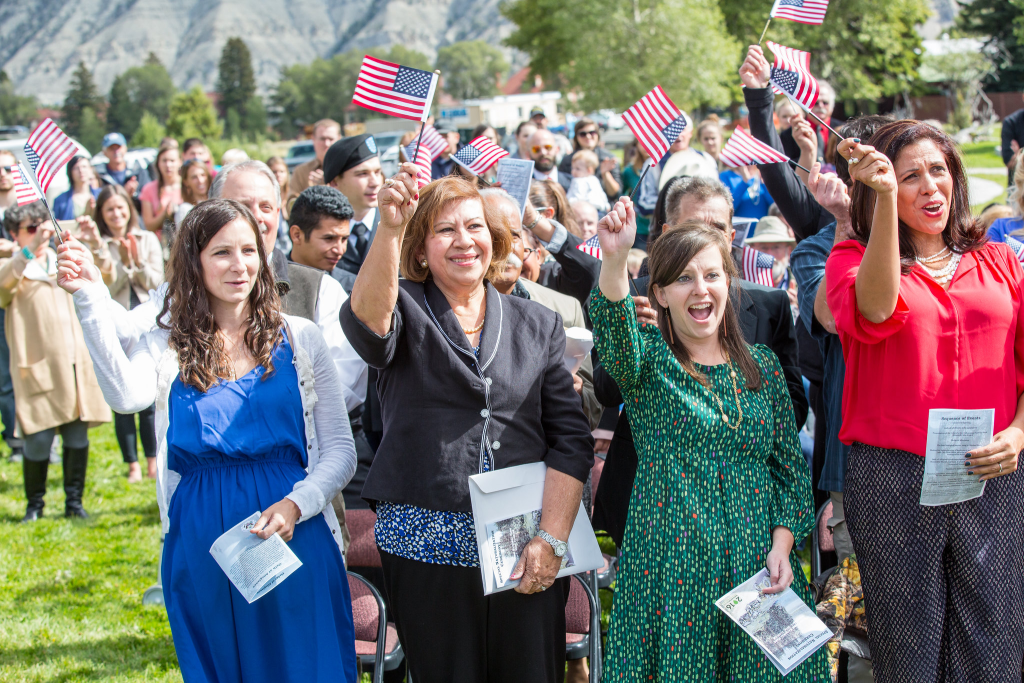Урок 6: Соединённые Штаты Америки

Get started
If this is the first lesson that you have done in Diverse Russian, we recommend you visit our brief For students page for some valuable information about how the book works before you start on the lesson.
We have found that the Chrome browser works the best with these materials, and the Safari browser has problems on occasion.
While the lessons may work on mobile devices, they were made with a larger screen in mind, and we recommend that you use the book on a larger screen.
About the lesson
This lesson will introduce you to several Russian-speaking communities in the United States, with a focus on the topic of family history and immigration.
In this lesson, you will:
- Learn about Russian and other languages spoken in the United States.
- Learn some basic facts about Russian-speaking communities in the United States.
- Practice pronouncing the names of the US states in Russian and talking about their locations.
- Learn about the use of the term “Russian” in reference to many different groups of immigrants from Russian-speaking countries.
- Learn and practice vocabulary related to family history and immigration.
- Learn how to talk about sexual orientation and same-sex relationships in Russian.
- Review and practice grammatical structures commonly used in discussions about family history and immigration, such as expressing that something happened in a certain decade, using words and phrases that help you relate events to time, constructions for taking about people’s origins and where they come from, using the words to be and to become to talk about roles and professions, and more.
- Learn about the major waves of Russian-speaking immigration to the US.
- Learn about several notable immigrants.
- Watch Russian trailers of famous shows and practice writing a review.
- Learn about Russian speaking communities in New York and explore Brighton Beech.
- Practice shopping at a “Russian” store and create a shopping list for your favorite recipe.
- Learn about the Russian-speaking LGBTQ+ community in New York.
- Discover a legendary restaurant in New York frequented by many notable Russian-speaking cultural figures.
- Talk about “Russian” restaurants and what you enjoy eating there.
- Learn about code-switching and how Russian speakers in the US sometimes mix English and Russian.
- Listen to immigrants’ perspectives on life in the United States and discuss their viewpoints.
- Listen to and discuss an interview with an immigrant artist from New York.
- Learn about different language schools that help immigrant children learn and prserve their heritage languages.
- Discover the American Armenian community and learn about some notable Americans of Armenian descent.
- Learn about and virtually visit Ukrainian Village in Chicago.
- Explore the history of Russian colonization in Alaska and learn about Russian influences that still exist today.
- Learn about the town of Ninilchik, Alaska and its Russian heritage.
- Conduct an interview with someone you know about their immigration story and share that story with other students.
Lesson links
You can always use the table of contents on the left side of the screen to jump to various pages in the lesson. These are pages that you might want to revisit as you progress through the lesson:
Семейная история и иммиграция: слова, которые вы, наверное, уже знаетe
Семейная история и иммиграция: новые слова
Семейная история и иммиграция: Грамматика
Лексика
Давайте поговорим!
Тексты
You can also find Quizlet sets based on the vocabulary in the chapter that you can practice with if you want to or if your instructor asks you to.
Acknowledgments
Lesson main author: Anna Tumarkin
Lesson contributing authors: Shannon Quinn, Olga Permitina

